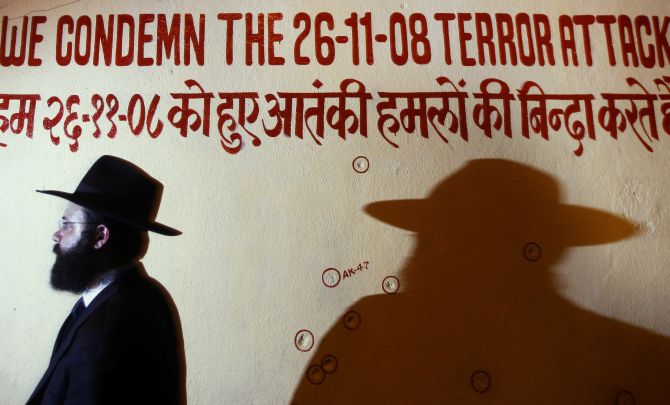Mumbai's Chabad House, which was attacked on 26/11 and which Israeli President Reuven Rivlin visited on Monday, is unlike any other Jewish centre, Rabbi Israel Kozlovsky tells Rediff.com's Vaihayasi Pande Daniel.

Rabbi Israel Kozlovsky didn't know till last night that Israel President Reuven Rivlin would visit the five-storeyed, sombre-faced, Chabad House in Colaba, south Mumbai, on Monday, November 21.
The kind of understandable precautions Israel takes for the safety of its leaders meant Kozlovsky was caught off guard. "It was not clear if it was going to happen, or not, due to security reasons," he told Rediff.com
Right from early Monday morning it had been a crazy jumble of activity for the rabbi and his wife Chaya.
The rabbi's pretty wife was organising vases of flowers. The rabbi was having a large picture of the head of the Lubbavitch-Habad order put up -- "Centre," he commanded the staff -- even as he adjusted and aligned the leather-bound holy books, their titles inscribed in gold in Hebrew, on the shelves that line the meeting room, his oddly-matched lunch of alu bhaji and an omelette half-eaten, cold and abandoned.
Israeli visitors, drivers, workmen floated in and out ferrying items and messages. Security passes were being arranged for the staff with the police and Kozlovsky sifted through IDs and photos.
The rabbi -- who has been in India for four years and was responsible for getting Chabad House up and running after the 26/11 terrorist attack killed the rabbi, his wife, six Jewish visitors and an NSG commando -- appeared calm, unflappable, not too worried by the chaos rippling alarmingly around him, talking and multitasking with five people, in person or on the phone, at the same time, occasionally breaking into a few well-chosen words of cheerful Hindi.
"Chalega!" "Barabar!!"
Already the narrow, choked lane, that leads up to Chabad House, situated adjacent to the Colaba market and Rex Bakery, was lined with police officers who wrongly inform you that the Israeli president would arrive at 10 am.
The rabbi fielded calls, e-mails and visits from Israelis telling them with a laugh, "The police is around, the National Security Guard is around," looking out of the second floor window at the street below,
"So I believe it is going to happen. Ya, ya, most likely it is going to happen. All the roads are blocked. Expect some traffic."
The president's visit is remarkable, Rabbi Kozlovsky said, because it meant he also has the "understanding that this Chabad House is unlike any other Jewish centre and any other community centre in the world."
The fact that the terrorists staked out as unlikely a target as the Jewish outreach centre in Mumbai, when they had hundreds of other targets to choose from in Mumbai where they could have caused more mayhem, Kozlovsky explained, signifies its importance to the State of Israel and the Jewish people.
"The mission of a Chabad House is to spread light in the world. (The mission of the terrorists) was exactly the opposite. (Jews had not been attacked on Indian soil) never, never till then and never since then, and god willing, never in the future," he says.
"So if they have chosen this place, we understand what is the value of this place. We, as Jews, believe that remembering the past is going to help us change the present and it is going to affect the future. (The onus is) on this place is to transform the darkness to light. Even a small light can chase away darkness," he said, contemplatively, combing a hand through his long beard.
The order and Kozlovsky plan to convert the building into a Mumbai landmark as they develop a museum on its roof to honour all the Mumbai victims of 26/11.
The city has no such museum that remembers everyone, "correct me if I am wrong," he added.
Filling the shoes the Holtzbergs suddenly left vacant with their tragic deaths, over the last four years, has been an enormous task for Kozlovsky and his wife Chaya.
"Not trying to compare myself to the Holtzbergs (whose parents, Kozlovsky adds, visit frequently), although we were sent here for the same purpose" because he felt the heinous attack on them was nothing compared to the enormous things they did with their lives, "touching thousands and thousands of souls, Jewish and not just Jewish."
The Kozlovskys, who initially restarted the outreach centre, the restaurant and the synagogue, are now turning their attention to getting the museum off the ground.
"At times, when we need some energy, we definitely look up to their picture and imagine what they were going through during their time here."